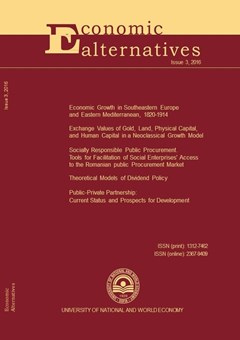Comparative Study on Monetary and Fiscal Policy in the Eurozone and Bulgaria
Author: Tsvetelina Marinova
Abstract
This paper aims at comparing monetary and fiscal policy in the eurozone and Bulgaria in order to reveal key challenges to these policies. The extractive nature of the institutional framework of the European Monetary Union results from the „hidden guarantee“ (EU accession premium) and existing institutions - fiscal rules. In Bulgaria, the Currency board arrangement imposes constraints on political institutions to conduct expansionary monetary policy. Thus fiscal discipline is of great importance for the maintenance of current monetary regime. In this respect monetary and fiscal policy are above all inclusive. Current challenges to monetary and fiscal policy in the eurozone and Bulgaria are mostly due to the institutional basis and its implementation.

